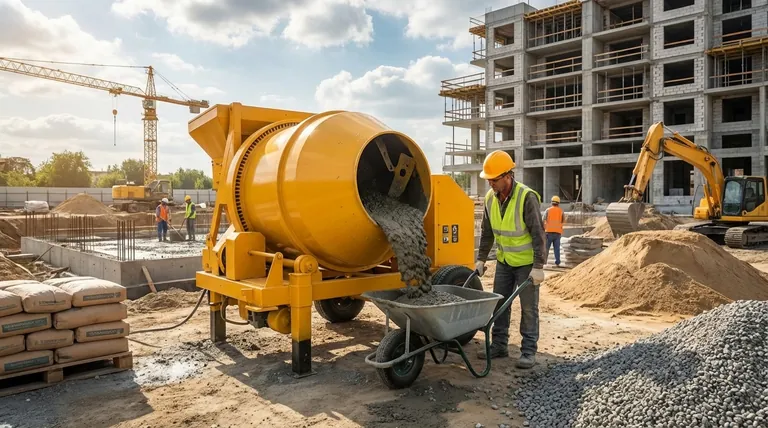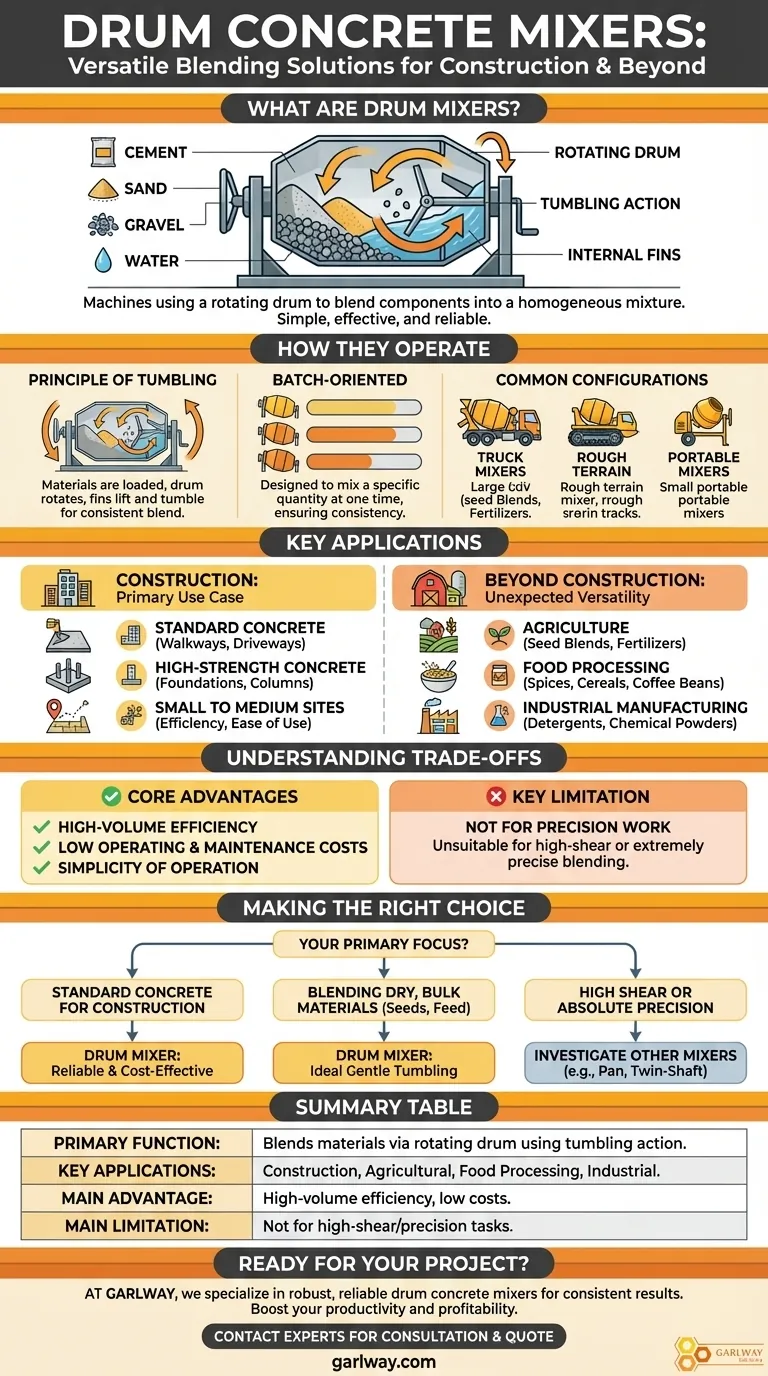At its core, a drum concrete mixer is a machine that uses a rotating drum to blend components into a homogeneous mixture. While its primary and most recognized application is for creating concrete on construction sites, its simple and effective design makes it a versatile tool across a surprising number of industries for general mixing tasks.
The drum mixer is the industry standard for high-volume, cost-effective mixing. Its key strength lies in its simplicity and reliability for materials that don't require high-intensity blending, making it the go-to choice for everything from construction concrete to agricultural seed blends.

How a Drum Mixer Operates
The Principle of Tumbling
A drum mixer's mechanism is straightforward. Materials like cement, sand, gravel, and water are loaded into the drum. As the drum rotates, internal fins or baffles lift and tumble the materials, ensuring they are consistently and evenly combined.
Batch-Oriented by Design
Most drum mixers are batch mixers, meaning they are designed to mix a specific quantity of material at one time. This process ensures consistency from one load to the next, which is critical for construction projects requiring uniform concrete strength.
Common Configurations
Drum mixers are not one-size-fits-all. They are adapted for specific environments:
- Truck Mixers: These are the large, familiar mixers on wheels used to transport ready-mix concrete for large pours.
- Rough Terrain Mixers: Built for durability, these are used on construction sites in harsh or remote locations.
- Minimixers & Portable Mixers: Ideal for smaller job sites, urban areas with space constraints, or residential projects.
Key Applications: From Foundations to Fertilizers
Construction: The Primary Use Case
This is the drum mixer's home turf. They are indispensable for a wide range of building tasks.
- Standard Concrete: Used for general-purpose work like walkways, driveways, and patios.
- High-Strength Concrete: Essential for creating robust foundations, columns, and load-bearing structures in residential and commercial buildings.
- Small to Medium Sites: Portable and stationary drum mixers are fixtures on nearly every small to mid-sized construction project due to their efficiency and ease of use.
Beyond Construction: Unexpected Versatility
The same simple tumbling action that works for concrete is effective for many other materials.
- Agriculture: Drum mixers are widely used for creating uniform blends of seeds, fertilizers, and animal feed.
- Food Processing: They are employed for gently mixing dry goods like spices, trail mix, coffee beans, and cereals without damaging the ingredients.
- Industrial Manufacturing: These mixers are used to produce detergents, chemical powders, and even blend sand and salt for winter road treatment.
Understanding the Trade-offs
The Core Advantages
The widespread use of drum mixers is due to a clear set of benefits.
- High-Volume Efficiency: They are excellent at mixing large quantities of material quickly and effectively.
- Low Operating & Maintenance Costs: Their simple mechanical design results in fewer breakdowns and lower upkeep costs compared to more complex mixers.
- Simplicity of Operation: Drum mixers are easy to operate, requiring less specialized labor.
The Key Limitation: Not for Precision Work
The primary trade-off for this simplicity is a lack of intensity.
A drum mixer relies on gravity and tumbling. It is not suitable for materials that require intensive, high-shear mixing or extremely precise blending. For complex chemical compounds or certain high-performance materials, a different type of mixer (like a pan or twin-shaft mixer) would be necessary.
Making the Right Choice for Your Goal
When selecting a mixer, your decision should be guided by the material and the desired outcome.
- If your primary focus is standard concrete for construction: A drum mixer is almost certainly your most reliable and cost-effective solution.
- If your primary focus is blending dry, bulk materials like seeds or feed: The gentle tumbling action of a drum mixer is ideal.
- If your primary focus is mixing materials requiring high shear or absolute precision: You should investigate mixers designed for more intensive blending.
Ultimately, choosing the right drum mixer configuration ensures you have a simple, powerful, and efficient tool for your specific mixing task.
Summary Table:
| Feature | Description |
|---|---|
| Primary Function | Blends materials via a rotating drum using a tumbling action. |
| Key Applications | Construction concrete, agricultural blends, food processing, industrial powders. |
| Main Advantage | High-volume efficiency with low operating and maintenance costs. |
| Main Limitation | Not suitable for high-shear or precision mixing tasks. |
Ready to find the perfect drum mixer for your project?
At GARLWAY, we specialize in robust and reliable construction machinery. Our range of drum concrete mixers is designed for efficiency and durability, helping construction companies and contractors deliver consistent results on every job.
Let us help you boost your productivity and profitability. Contact our experts today for a personalized consultation and quote!
Visual Guide

Related Products
- JZC400 Mobile Small Concrete Mixer Cement Mixer Machine
- Portable Ready Mix Concrete Mixer Equipment
- Hydraulic Concrete Mixer Machine Cement Mixing Equipment for Mixture Concrete
- Commercial Electric Concrete Mixer Machine HZS 50 Small Batch Plant for Sale
- Portable Concrete Mixer Machine Equipment for Mixing Concrete
People Also Ask
- What is a mobile mixer? The Ultimate Guide to On-Site Concrete Production
- How do electric portable cement mixers differ from gas-powered ones? Choose the Right Power for Your Job Site
- What makes towable cement mixers suitable for certain projects? Unlock On-Site Efficiency & Mobility
- How much concrete can you mix in a small mixer? Achieve Perfect Batches for Your Project
- How does a mobile concrete mixer improve efficiency? Gain On-Demand Concrete Control



















